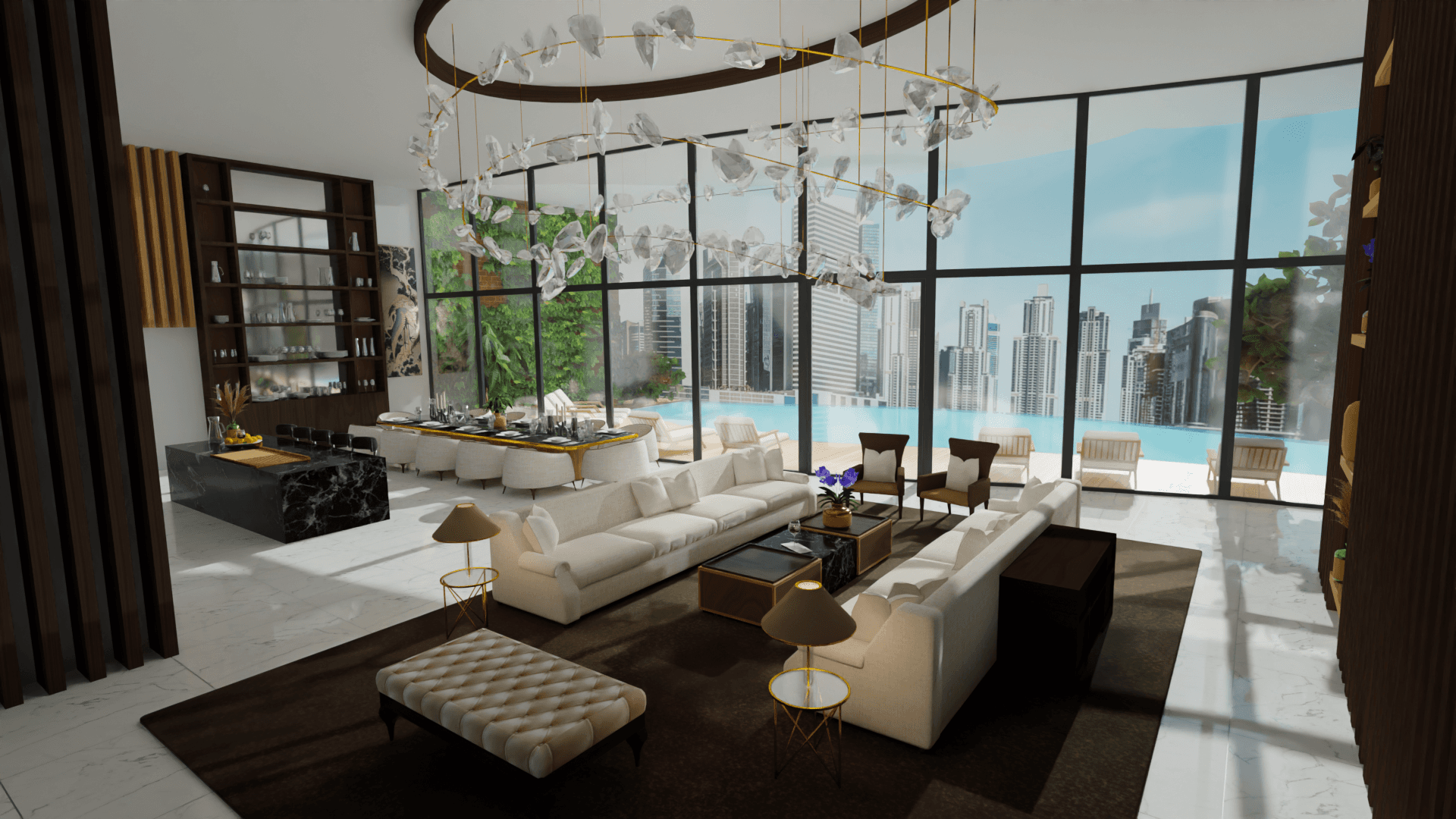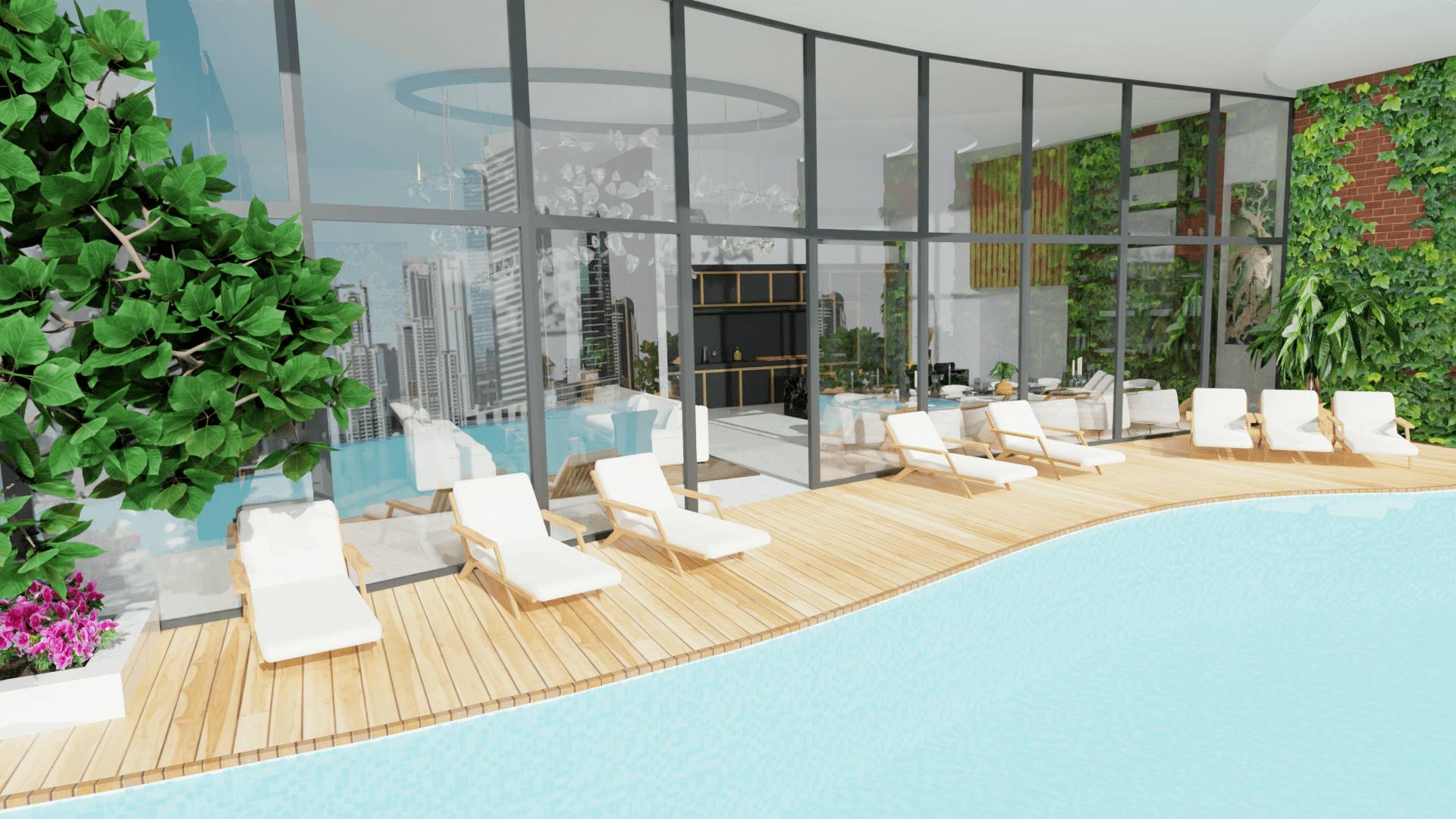Back to Blog
Metaverse Showrooms for Real Estate and Architecture
Aug 15, 2023
Callum Moates
The metaverse represents the convergence of our physical and digital worlds, creating a shared virtual space that integrates the 3D internet, augmented reality, and virtual reality. As technology advances at an unprecedented rate, industries across the board are undergoing digital transformation. The real estate and architecture sectors are no exception. This blog post aims to explore the profound impact of the metaverse on these industries, mainly through the innovative concept of virtual showrooms.
Virtual showrooms in real estate
Real estate, an industry deeply rooted in physicality, is experiencing a digital renaissance. Virtual showrooms created by leveraging the metaverse are at the forefront of this change, offering immersive, digital replicas of properties.
Here are some advantages of virtual showrooms in real estate:
Immersive 3D tours: Unlike traditional photos or videos, virtual showrooms offer a 360-degree view of properties. Potential buyers can virtually walk through properties, exploring every nook and cranny, giving them a comprehensive understanding of the space. Engel & Völkers is a luxury real estate company that seamlessly blends international property listings with 360-degree virtual viewings. The immersive experience allows potential buyers to view listed properties from multiple perspectives and view details of the finishing of different aspects of the estate. The experience can also be visited with friends and family, making it highly social.
Personalization: Whether a potential buyer is in a different city or even a different continent, they can explore properties at their convenience and personalize them as per their choice. Rooom offers 3D visualizations for companies in the real estate sector for clients to view through the web, virtual reality (VR), or augmented reality (AR). Their platform is not just about showcasing; developers are given the tools to craft interactive 3D property models and customize property elements, like the color of the walls. This approach ensures that each presentation is tailored to the customer, offering potential clients an enhanced and personalized buying journey.
Cost-efficiency for realtors and developers: Hosting physical open houses or property tours can be expensive, considering the costs of staging, transportation, and promotional materials. Once set up, property sellers can showcase virtual showrooms to unlimited potential clients without incurring additional expenses per viewing. These virtual viewings can lead to significant savings, especially for properties on the market for extended periods. Hegias is at the forefront of integrating VR for real estate showrooms and construction projects. Their solution offers functionalities to compare different models, furnish rooms, and test processes digitally, making it efficient and cost-effective, with the company claiming to be up to 100 times less expensive than traditional solutions.
Data collection and insights: Virtual showrooms often come with analytics capabilities for realtors and developers to gather data on how potential buyers interact with the virtual space – which rooms they spend the most time in, which features they interact with, and more. This data can provide valuable insights into buyer preferences and behaviors, allowing realtors to tailor their marketing strategies effectively. It can also help understand which aspects of a property are most appealing or might need enhancements.

Architectural visualization
The 3D internet allows architects to prototype complex designs, test multiple concepts, and collaborate with clients and designers to execute a project efficiently. Here are a few ways architects use the metaverse for project visualizations:
Design concepts: The metaverse allows architects to create photorealistic 3D models of their designs. Clients can immerse themselves in these models and interact with design elements, experiencing the architect's vision firsthand.
Simulate conditions and materials: Within the metaverse, architects can simulate different times of day, seasons, and lighting conditions to mimic how it impacts a project. Developers can also accurately represent different building materials, giving clients a holistic project view. For instance, NVIDIA's Omniverse platform revolutionizes 3D design by offering unified workflows that integrate with popular 3D tools, enabling architects to build physically realistic and high-fidelity simulations. Enhanced by generative AI, it allows rapid creation and editing of building materials, ensuring real-world accuracy.
Immediate feedback: Architectural visualizations leveraging the 3D internet offer an interactive and collaborative interface that acts as a dynamic canvas, bridging the gap between designers and clients. As clients navigate the virtual space, they can instantly pinpoint specific elements, offering immediate feedback. This real-time communication streamlines the revision process, eliminating the traditional back-and-forth of design iterations

Advantages of virtual showrooms
The benefits of virtual showrooms extend beyond just impressive visuals. They represent a paradigm shift in how industries operate. Here are some primary benefits of virtual showrooms for the architectural and real estate industries:
1. Engaging and interactive showcases: Virtual showrooms offer a 3D, lifelike representation of spaces, allowing customers to explore them from all angles while also having the ability to interact with elements and extract more information about them. For example, Australia-based company IMMERSIV has developed a virtual display showroom using Cesium for Unreal that lets potential buyers visualize new estate developments, surroundings, and internal features. One showcased project is the Imperial Square project on Australia's Gold Coast.
2. Cost-efficient: Traditional showrooms, especially for real-estate and architecture companies, demand substantial physical space maintenance and promotion costs. Transitioning to a digital showroom can drastically reduce these overhead costs and allow individuals to see multiple property designs and layouts. Companies can allocate resources more efficiently without needing physical premises and the associated upkeep. This digital shift streamlines operations and offers a broader reach to potential clients, making it a cost-effective solution for real estate and architecture businesses.
3. Global reach: The National Association of Realtors states that 44% of property buyers search for potential spaces online. Offering visualizations of architectural projects and real estate property in the metaverse makes it accessible to global customers or investors searching online, who do not need to travel for project viewings physically.
4. Better decision-making: Virtual showrooms and property presentations within the 3D internet helps potential buyers and investors assess real estate before committing. These viewings help support a buyer's journey and help them make informed decisions driving conversions.

Conclusion
The metaverse is not just a technological trend; it's a testament to human ingenuity and our relentless pursuit of innovation. As the boundaries between our physical and digital worlds blur, industries must adapt or risk obsolescence. Virtual showrooms in the metaverse offer the real estate and architecture sectors a path forward, promising unparalleled visualization, global accessibility, and significant cost savings. As we stand on the cusp of a new digital era, industry professionals must embrace these innovations, ensuring they remain at the forefront of their respective fields.
Are you looking to provide immersive 3D real estate or architectural visualizations? We can help you build your plans and designs in the metaverse. Get in touch with us!
Aug 15, 2023
Callum Moates
Subscribe to our monthly newsletter
About Landvault
Landvault is building infrastructure to accelerate the metaverse economy, by building tools to create, deploy and monetize content. The company has helped over 200 clients enter the metaverse, including both Fortune 500 companies and government organizations like the Abu Dhabi government, Mastercard, L’Oreal, Red Bull, and Heineken. The company has raised a total of $40m over the past three years and continues to pioneer technological advancements.
